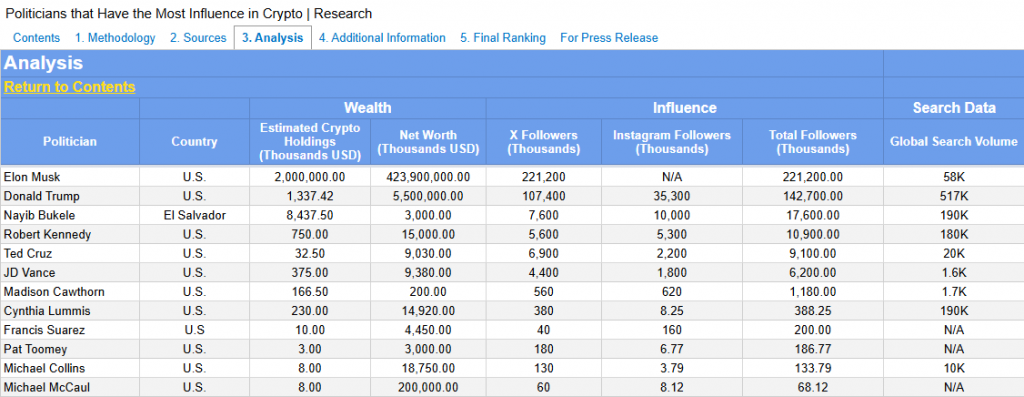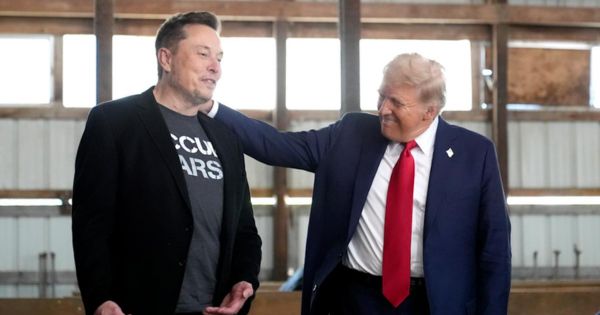Musk surpasses Trump to become the most influential person in crypto
ApeX Protocol has released a data analysis ranking the most influential figures in cryptocurrency, with Tesla CEO Elon Musk surpassing Donald Trump to become the most influential person in the field. His $2 billion in cryptocurrency assets and 221.2 million social media followers far exceed those of other competitors.
The report notes that Trump ranks second with $1.34 million in cryptocurrency assets and 142.7 million followers. Salvadoran President Nayib Bukele comes in third with $8.44 million in cryptocurrency assets and 17.6 million followers. It’s worth mentioning that there is only one woman in the top ten, Senator Cynthia Lummis, as well as one non-U.S. leader, Bukele.

The influence index from ApeX Protocol shows that fame and follower count are significantly more important than mere wealth. Musk's leading position is based on his substantial cryptocurrency assets and expansive social media influence. Trump follows closely, with his influence primarily stemming from his active promotion of pro-cryptocurrency policies.
President Bukele maintains a top-three position due to his early adoption of Bitcoin and ongoing social media engagement. Following him are former presidential candidate Robert F. Kennedy Jr. and several U.S. Congress members who actively advocate for pro-cryptocurrency policies.
Musk’s Cryptocurrency Strategy: A Blend of Bitcoin, Dogecoin, and Political Strategy
Musk actively enhances his influence in the cryptocurrency space. On July 7, 2025, he announced the formation of a new "American Party" and confirmed on the X platform that the party would "embrace Bitcoin," bluntly stating that "fiat currency is hopeless."
Musk holds a significant amount of Bitcoin through Tesla: in early 2021, Tesla purchased $1.5 billion worth of Bitcoin and currently holds approximately 11,509 BTC (valued at about $1.26 billion). His public support for Dogecoin has also consistently influenced market fluctuations; for example, after announcing the formation of his political party, Dogecoin’s price rose by 5%. He frequently tweets about mysterious meme coins and payment hints, with past posts like "$Doge" causing significant price spikes or drops.
Even the feud between Musk and Trump relates to cryptocurrency: on July 1, Trump jokingly stated on social media that "DOGE should take a close look at Musk's company," highlighting how cryptocurrency has become a focal point in their social media war.
Trump’s Cryptocurrency Plans: Bitcoin Reserves and Active Policy Promotion
Ranking second, Trump actively promotes pro-cryptocurrency policies. On his first day back in office, he signed an executive order to establish a U.S. Strategic Bitcoin Reserve and digital asset reserves, aimed at using seized cryptocurrencies as reserve assets and pledging to make the U.S. the "crypto capital of the world." His plan proposed in March 2025 sparked a market rebound, with Bitcoin prices soaring 10% to reach $94,000—leading to increases in Cardano, Solana, and Ripple as well, as he listed them among reserve assets.
In early March, Trump hosted a White House cryptocurrency summit to reverse the previous administration's crackdown and lobbied Congress to pass pro-cryptocurrency legislation, publicly urging Republicans in mid-July to support a landmark cryptocurrency bill, stating on social media: "The House will soon vote on a bill that makes America the undisputed leader in digital assets—digital assets are the future."
However, this plan has faced resistance within the Republican Party: a small group of conservative House members briefly stalled the debate on Trump-supported cryptocurrency bills (the GENIUS Act and related measures). Nevertheless, Trump's administration's strong stance in favor of cryptocurrency keeps him at the forefront of the influence ranking. His nomination of Robert F. Kennedy Jr. as Secretary of Health and Human Services, along with Musk being viewed as a potential SEC chair, further solidifies this influence.
Influence of Other Political Figures and Independents
In addition to Musk and Trump, the report mentions other influential figures, such as Salvadoran President Bukele, whose early Bitcoin adoption and ongoing social media interaction maintain his influence. U.S. Senator Cynthia Lummis, as chair of the Senate Digital Assets Subcommittee, actively promotes pro-cryptocurrency legislation, such as reintroducing the "Bitcoin Bill" in March 2025 and assisting with the GENIUS stablecoin bill, securing her position on the list. Vice President J.D. Vance and Texas Congressman Ted Cruz also rank highly due to their pro-cryptocurrency policies. Additionally, Robert F. Kennedy Jr.’s public support for Bitcoin has elevated his influence.
The Evolution of Regulation, Legislation, and Influence
The regulatory wave of the first half of 2025, along with debates in Congress over cryptocurrency legislation, affects the influence rankings in the cryptocurrency space. Regulatory dynamics in places like Hong Kong, Singapore, and Brazil are also significant. All these political factors impact the influence of individuals who support or appear to support cryptocurrency. For example, the departure of former SEC nominee Jay Clayton paves the way for a pro-cryptocurrency SEC chair as promised by Trump. Progress on the "Bitcoin Bill" and the "GENIUS Act" will further influence the standing of related political figures.
In conclusion, the current power brokers in the cryptocurrency space are not limited to founders of coins or executives of exchanges but are a mix of tech billionaires, media figures, and politicians who are collectively shaping the future of this field.




